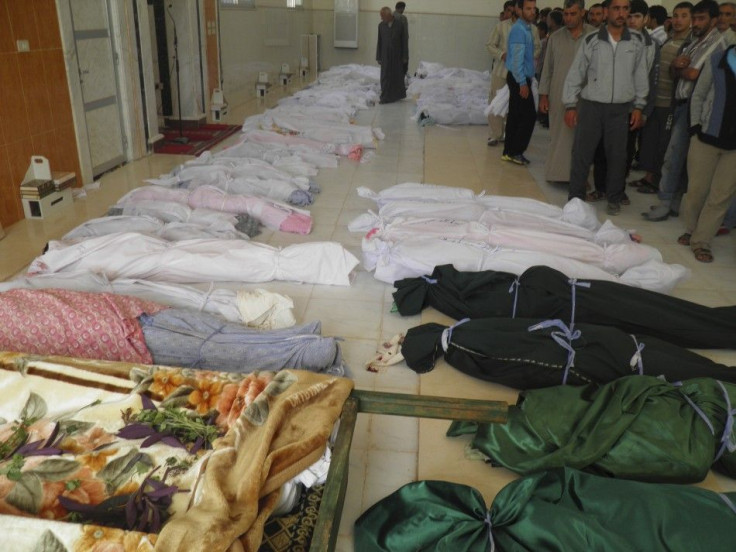Syrian Regime Helicopters Attack Damascus Suburb; Dead Bodies Rot On Streets

Pro-regime forces Monday continued attack on Douma, a city in the Damascus province, using helicopters which left dead bodies scattered on the streets.
The aerial attack took place two days after a U.N.-sponsored international agreement Saturday decided to set up a transitional government in Syria, based on a mutual consent, thereby giving veto powers to President Bashar al-Assad, the opposition and other groups.
The bombardment of Douma continued today using helicopters, Mohamed Doumany, a Syrian activist, told Reuters. Some activists entered the city today and they saw at least seven decaying bodies in the streets under the sun. One man had been executed inside his house.
There is huge destruction in the city, which is almost empty. Only a few of its people remain inside, he said.
Hundreds of civilians were trapped in Douma as regime forces launched an attack on the region Saturday, the Britain based Syrian Observatory for Human Rights reported.
The security forces have seized control of the main hospital in Douma, the monitors said as reported by the AFP. There are no doctors in the town, though dozens of wounded need urgent care.
United Nations human rights chief Navi Pillay said the flow of weapons to Syrian forces as well as the rebels had intensified the crisis.
The ongoing provision of arms to the Syrian government and to its opponents feeds additional violence, Pillay told the UN Security Council, as reported by Reuters. Any further militarization of the conflict must be avoided at all costs.
Pillay didn't mention the names of the arms suppliers although Russia and Iran largely supply weapons to the Syrian regime. Qatar and Saudi Arabia are believed to be delivering arms to the opposition groups while the U.S. maintains that it supplies only non-lethal aid to the rebels.
Meanwhile, Turkey toughened defense measures against Syria more than a week after the Syrian forces shot down a Turkish military jet on the Mediterranean near the joint border.
A Turkish convoy of 30 military vehicles and trucks loaded with missile batteries arrived in Turkey's coastal town of Iskenderun in the Hatay province, 50 kilometers from the Syrian border, a Turkish state-run news agency reported last week.
Turkey scrambled six F-16 fighter jets in three separate incidents, in response to Syrian military helicopters heading towards the joint border over the weekend, the commander of the Turkish armed forces said Monday.
Turkey's Anatolia news agency Friday reported the deployment of heavily armed and guarded military vehicles at military installations in Sanliurfa province.
Although Turkey hasn't declared war on Syria, Prime Minister Recep Tayyip Erdogan last week said Syria was a clear and present danger for Turkey, and all military vehicles approaching the 900-kilometer Turkish border with Syria were to be considered a threat.
We just wish to defend our borders and we don't want any kind of incursions, Turkish foreign ministry spokesman Selcuk Unal was quoted as saying. Last month there were five different and separate airspace violations by Syrian helicopters and there (are) also other negative developments affecting the daily situation on our side of the border.
© Copyright IBTimes 2024. All rights reserved.












